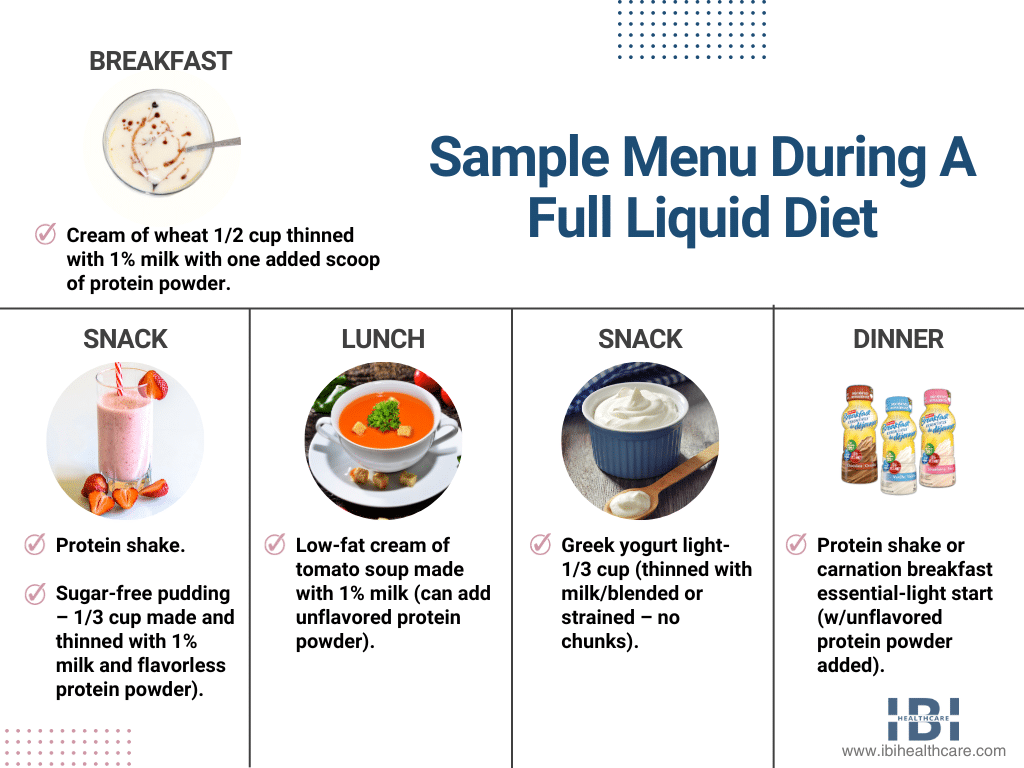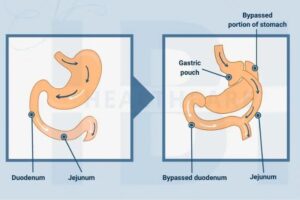Why Do I Have to Go on a Full Liquid Diet after Bariatric Surgery?
During bariatric surgery such as Gastric Sleeve Surgery or Gastric Bypass Surgery, changes are made to your digestive system. Both surgeries reduce the size of your stomach by permanently removing between 70% to 80% of the stomach and leaving you with a small sleeve-like pouch.
In addition, surgeries such as gastric bypass and Duodenal Switch also make alterations to the digestive system and the way the body processes and absorbs nutrients from food.
After having these changes made to the stomach and digestive system, the body needs time to heal and would not be able to adequately process the foods as it did before surgery.
While patients are still in the hospital they are given clear liquids to keep them from becoming dehydrated and also to keep their newly redesigned stomachs from becoming irritated. Now, they will be starting the next phase of easing the digestive system back to work by following a full liquid diet.
Is the Full Liquid Diet the Same as the Liver Shrinking Diet?
No, the diet that is followed pre-op is specifically designed to shrink the liver and reduce surgical risks. The Liver-Shrinking Diet is high in protein and low in carbohydrates to place the body into ketosis. They contain some of the same elements but are consumed in different formats. Although they are similar, they are not the same.
How Long Do You Have To Be On A Liquid Diet After Bariatric Surgery?
Once you have finished the clear liquid diet portion of your post-surgery diet, you will need to adhere to a full liquid diet for approximately two weeks or the length of time determined by your surgeon.
What are Full Liquids vs. Clear Liquids?
Moreover, full liquids are foods that you cannot see through in the form of liquid or turn to liquid at room temperature. These foods are what you will be concentrating on during this portion of your post-bariatric surgery diet.
The consistency of these foods should pour off of a spoon smoothly, with no lumps or globs. Normally, if you are tolerating clear liquids with no issues, your surgeon will approve the move to full liquids. It may be as soon as the second-day post-op.
Tips to Keep in Mind During a Full Liquid Diet After Weight Loss Surgery
After undergoing bariatric surgery, what you eat and the way you eat are much more important. These factors can determine whether you achieve a state of health or experience malnutrition. They play a crucial role in either facilitating your stomach and digestive system’s recovery from surgery or impeding the healing process. Additionally, here are some key things to keep in mind as you follow the full liquid diet after bariatric surgery.
Hydration
Consequently, drink the recommended amount of approved liquids every day to:
- Prevent dehydration.
- Prevent constipation.
- Help flush your system of waste.
- Help keep you from feeling hungry between meals.
- Carry water with you everywhere and take small sips from it all day long (except 30 minutes before and after eating)
Protein
Your surgeon will provide you with your protein goal but it normally ranges between 60-90 grams per day. Since you will not be able to eat as much and is critical you meet your protein goal each day, always eat the protein portion of your meal first.
Supplements
To avoid complications such as malnutrition or anemia it is important to take the supplemental vitamins and minerals recommended by your surgeon. This may be a new ritual for you so you may wish to set reminders on your phone.
Eat Slowly
It can take up to 20 minutes before your brain notifies your stomach that you are full. Overeating can cause nausea, vomiting, or other undesirable side effects.
Define Mealtime
Even though it may seem silly when you are only having liquids to sit at the table and “have your meal”, it is important in building new healthy habits.
Pre-measure Meals
Furthermore, your new smaller stomach pouch will only be able to tolerate about 2-4 ounces. These are liquid ounces and can be measured easily in those little medicine cups or you can use a sharpie to mark another clear glass for accuracy.
Liquid Temperature
Your digestive system may be sensitive to extreme temperatures so you may want to start by consuming warm liquids and avoiding very cold ones.
Fill The Void
It can be difficult to take 20 minutes to consume 2-4 ounces, especially when we are accustomed to doing things at a faster pace and are super busy, but it is important that your food, even during the liquid diet, is not consumed too fast. Perhaps during the full liquid diet phase, you can read during mealtimes. Figure out a good place for you and implement it during your meal. For example, read 4 pages and then take a small sip, and then read 4 more pages, and so on. It is a good idea to avoid watching the television while you are eating as many patients have historically formed bad snacking and eating habits during TV time.
Plan Menus In Advance
For this reason, you may wish to plan your menus for the week in advance. This will help you cut down on grocery trips and you can also prepare soups and some meal elements in advance. Creating a tasty soup and freezing it in “serving size” portions makes it easy and quick to have healthy compliant meals during the week.
During your full liquid diet phase, there are things you need to avoid so you don’t experience unpleasant complications. Subsequently, some of the things you should avoid are listed below.
Dense Liquids
- On the other hand, if you can draw lines in the liquid and they stay separated for a few seconds, you will need to dilute it. Your digestive system is not ready for this food texture yet.
Chunks
- Everything you eat at this point needs to be silky smooth and free from anything chunky. Things such as yogurt that has fruit on the bottom need to be thoroughly blended or strained.
Sugar
- Liquids such as fruit juice, milkshakes, or bottled sweet tea that are full of sugar will not only cause side effects like dumping syndrome but will sabotage your weight loss efforts.
Carbonation
- Liquids that are carbonated can irritate your stomach and digestive system and may do so from this point on. Following their surgery, some weight loss surgery patients can no longer tolerate carbonated beverages.
Straws
- However, in the aftermath of undergoing bariatric surgery, some patients have issues using straws. Conversely, straws can introduce extra air into your stomach and cause discomfort. Also, it is often hard to control how much liquid is consumed when using a straw. Some weight loss patients have reported having issues using straws while others had none.
What Liquids Can I Drink on a Full Liquid Diet?
Firstly, liquids that are non-carbonated, caffeine-free, and contain no sugar are the beverages that count towards your hydration goal for the day. These liquids include:
- Water.
- Sugar-free drinks.
- Decaf tea.
- Decaf coffee.
- Low sodium broth:
- Sugar-free Jell-O.
- Sugar-free popsicles.
What Can You Eat on a Full Liquid Diet?
However, moving up from a clear liquid diet to a full liquid diet is not that glamorous, I’m not going to lie. Regardless, it is one more step towards your recovery and a healthier lifestyle.
While on the full liquid diet, you are allowed to have everything from the clear liquid diet and can choose from the food groups and tables below. There are still many foods, fruits, and vegetables that are not allowed because your stomach is still healing and can’t adequately process them.
Significantly, much of your liquid diet is going to consist of foods from the protein-rich dairy products list (see below). Additionally, these are easy on your healing stomach and contain much-needed protein. Most meats are not approved during this phase of the diet but the ones listed below can be used as additives to make or fortify soups or broths. During the full liquid diet phase, there are very limited vegetable and fruit choices. This is because the stomach can not easily digest most fruits and vegetables yet and also because it is more important that you are meeting your daily intake of protein during this time.
Approved and Disapproved Foods During Bariatric Full Liquid Diet Chart
| Approved Choices | Avoid These |
|---|---|
| Protein-Rich Dairy Products | |
|
|
| Protein, Meat, Poultry, Fish & Eggs | |
|
|
| Cereals | |
| Cooked cereals made & thinned with 1% milk or soy milk:
|
|
| Vegges | |
|
|
| Fruits | |
|
|
| Dessert | |
*Do not count as a meal/snack |
|
What Can I Eat After Gastric Sleeve Surgery While I Am on a Full Liquid Diet?
Whether you have had a gastric sleeve, gastric bypass, or another type of bariatric surgery, you will need to be on a full-liquid diet for a short time. Here is an example of what a typical menu might look like for a day during this time:

The full liquid diet, however, is just a step up from the clear liquid diet that comes immediately after weight loss surgery. It does not offer the most exciting choices but, if you use your imagination and creativity, you will make it through this short dietary phase. Just remember, however, that your stomach and dietary system are healing and adjusting to the alterations that have been made. Indeed, this is merely a temporary phase as your system learns and adjusts to these changes.
Nonetheless, those interested in learning more about bariatric surgery or weight loss options, reach out to IBI Healthcare Institute today for a personal consultation!











